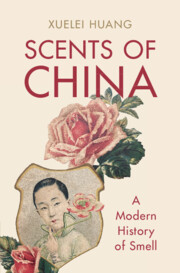
How did past environments, objects, and people smell? What can aromas and stenches tell us about history and culture? Scents of China takes you on a smell-walk through modern Chinese history, tracing stories about opium, dried fish, Florida water, cesspools, class enemies, and many other sweet, stinky, and unnameable odours.
We might have been told that opium smells sickly, but for an eighteenth-century Chinese man of the elite class, the blue fumes smell fragrantly of status and privilege. We might think that the scent of cologne is unquestionably what we call ‘fragrant’, but for a Chinese village gentleman, the perfume can be overwhelming to his unprepared nerves. Foul or fragrant is not a fixed attribute of olfactory chemicals; the sense of smell is highly individualized, fluid, and sensitive to context. My book excavates a multitude of Chinese scents perceived diversely through different historical noses. To what extent is the diversity and indeterminacy of smell perception important?
This question should be discussed in the context of the master narrative of olfactory modernity forged first by Alain Corbin. Corbin’s tour de force study of eighteenth-century French smellscapes (The Foul and the Fragrant: Odor and the French Social Imagination) was the immediate inspiration for me to conceive a project about Chinese smells. Corbin’s intellectual pursuit is truly groundbreaking as he unveils how the now internalized olfactory codes-deodorized environments and bodies, a distaste for strong-smelling perfumes, etc. -were developed alongside a set of economic, socio-political and cultural changes under the rubric of ‘modernity’. Ultimately the goal of the modern olfactory revolution seems to be about redefining what is foul and what is fragrant. And overall this ‘revolution’ has been a success, with many of its doctrines deeply embedded in our sensorium and sensibility around the globe.
China is inescapably tied to such an olfactory revolution, but are smells governable according to a certain blueprint? Can odours reveal something we’re blind to seeing with the naked eye? While various efforts were made by different social actors to enforce the ‘deodorization’ law within Chinese smellscapes, malodours resurfaced outside the zone of modernization, reminding us of the uneven redistribution of sensescapes that lies at the heart of modernity’s injustice. While the enterprise of colonial capitalism was eagerly promoting the benefits of mass-manufactured perfumes in relation to hygiene and health, what truly fascinated young Chinese iconoclasts were libidinal odours that represented the spirit of freedom from the shackles of Confucianism. While the Communists embraced the principle of deodorization in their sanitary campaigns, their propaganda texts were malodourous sites where stench was deployed metaphorically to vilify class enemies. These paradoxes point to the fluidity of smell perception and the inconsistency of the bodily realm.
If we agree that human senses are culturally constructed, the modern olfactory revolution is certainly an episode in which culture is particularly diligent in fine-tuning the neurons to serve modernity’s various agendas. The Chinese stories told in my book show how major socio-political forces-colonialism, consumer capitalism, anti-Confucianism, and Communism-were mapped onto the Chinese body through the senses. Yet, the volatile molecules and indeterminate neurons also collaborated closely in making programmed olfactory modernity not entirely sustainable. Ultimately, if we take an attentive sniff, our nostrils will register a wider spectrum of olfactory qualities beyond the prescribed foul and fragrant.
Image description: A satirical cartoon about (perfumed) femininity and modernity in 1930s China.
Credit line: Shidai manhua (Modern Sketch) 10, October 1934.

Scents of China by
Xuelei Huang
Latest Comments
Have your say!